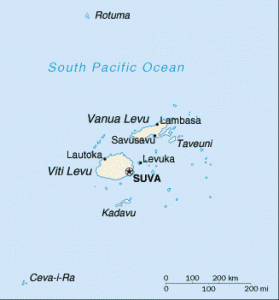From Reuters:
Fiji has been plunged into a political crisis after the president reappointed military chief Frank Bainimarama as interim prime minister on Saturday, less than two days after a court ruled his 2006 coup and subsequent government illegal.
 Bainimarama tightened media censorship on Wednesday and continued to refuse to hold elections before 2014.
Bainimarama tightened media censorship on Wednesday and continued to refuse to hold elections before 2014.
The Australian Broadcasting Corp. said local technicians had been ordered by the military government to shut down two FM relay stations in the capital Suva and the western sugar town of Nadi.
But ABC said its Radio Australia news programme was still broadcasting on shortwave transmitters.
The military government has asked that Fiji reporters only publish “positive” news, or in their terms, “journalism of hope.” This censorship has also pushed Radio New Zealand International out of Fiji.
Other reports have indicated that the government is now trying to restrict internet news sources and blogs. Internet cafe owners are under threat of being shut down, as well.
UPDATE (21 Nov 2009): The military-installed Fiji government has removed all broadcasting licences and given Attorney-General Aiyaz Sayed-Khaiyum the absolute power to renew or redistribute them without any compensation to those whose licences are stripped. (Source: The Australian via RNW Media Network)
Radio without borders
 When people ask whether we need shortwave radio in this internet information age, events like this provide a clear affirmative answer. Once ABC and RNZI were ousted from Fiji, these broadcasters immediately reiterated to Fiji listeners that their programming can be heard all day on shortwave (see schedule below).
When people ask whether we need shortwave radio in this internet information age, events like this provide a clear affirmative answer. Once ABC and RNZI were ousted from Fiji, these broadcasters immediately reiterated to Fiji listeners that their programming can be heard all day on shortwave (see schedule below).
And that’s the remarkable thing about shortwave–it penetrates borders without regard to who is in power or to restrictions placed upon local media. Even when the internet is crippled. Can shortwave broadcasts be jammed? Sure–but it’s not all that easy to do; it’s much more difficult than, say, seizing control of a country’s internet service provider, or (as in the case of Fiji) of their local broadcasters and stations. Plus, jamming usually targets a specific frequency, so if radio listeners find their broadcasts jammed on one frequency, there are often literally dozens of ways around the jam–other frequencies often carry the same or similiar programming from the same or other international broadcasters.
Much of the decline of shortwave radio is attributed to the end of the Cold War. During the Cold War era, national superpowers were obsessed with piercing borders with their respective messages; since the Cold War ended, that technology is no longer as driven. But as the Fiji story demonstrates, the need is very much ongoing, perhaps even more so, as small countries try out a variety of political options, often exercising this power along the long and twisting road to democratic governance. Now, shortwave should have a new and broader focus: sending news, music, education and human interest programming to the developing world.
For an example of an organization making a difference through shortwave radio technology, check out Ears To Our World.
ABC Shortwave Broadcast Schedule to Fiji
Local Time 04:00 – 09:00
Frequencies: 5995 7240 7240 9580 9710 11650 11660 11880 12080
Local Time: 09:00 – 12:00
Frequencies: 11650 11660 12080 12080 12080 13630 15230 15515 17785 17795
Local Time: 12:00 – 16:00
Frequencies: 12080 12080 15240 15515 17795
Local Time: 16:00 – 19:00
Frequencies: 12080 12080 15160 15240 15515
Local Time: 19:00 – 04:00
Frequencies: 5995 6020 7240 9580 9590 12080 12080 12080 13630 15160 15240



